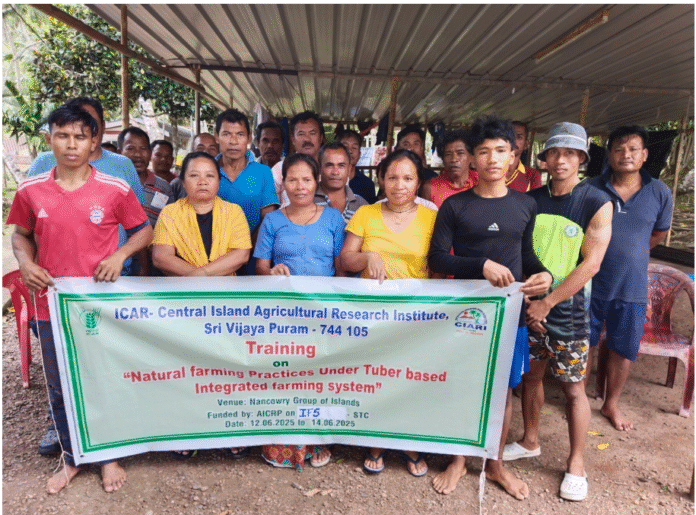To promote sustainable agriculture and improve farm incomes in tribal regions, scientists from the Central Island Agricultural Research Institute (CIARI) conducted a three-day training programme on natural farming at Nancowrie Islands from June 12 to 14. The initiative, under the Scheduled Tribe Component (STC) of the AICRP on Integrated Farming Systems, was held in collaboration with ICAR-Krishi Vigyan Kendra (KVK), Car Nicobar.
The event focused on tuber crops-based integrated farming and included practical demonstrations for 139 farmers from villages like Kakana, Pilpillow, and Munak. Led by senior scientist and principal investigator I. Jaisankar, the sessions showcased CIARI’s Organic Integrated Farming System (OIFS), highlighting the use of vegetables, spices, fodder, fruits, and livestock such as poultry, pigs, and fish for diversified farm income.
Tools and Techniques for Sustainability
In addition to lectures, farmers were introduced to sustainable agricultural tools and practices. A live demonstration of the Dweep Leaf Separator – used for removing midribs from coconut leaves, was conducted, and 50 units were distributed to women farmers. The tool aims to ease farm work and increase productivity.
Farmers also received 45 crowbars, 40 axes, 30 spades, 500 sweet potato rooted cuttings, and 500 tapioca sets to support implementation of integrated practices. CIARI experts shared techniques in organic waste management and pest and disease control aligned with natural farming principles.
Community Engagement and Outreach
The training was coordinated by scientists from KVK, Car Nicobar, including Santosh Kumar, Abhilash, and Talaviya Harshang Kumar. The programme concluded under the overall guidance of E.B. Chakurkar, Director of ICAR-CIARI.
This initiative is part of CIARI’s ongoing efforts to enhance tribal farmers’ self-reliance through eco-friendly farming models that ensure long-term sustainability of natural resources.





